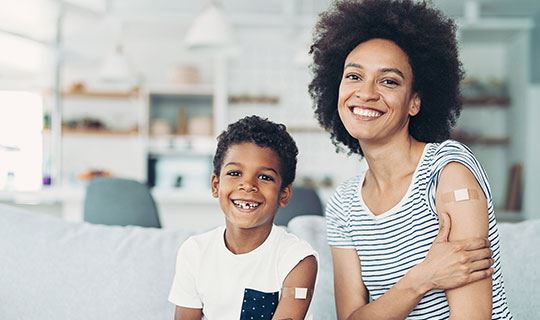
By Dr. Amisha Malhotra, Pediatric Infectious Disease Physician at the Bristol-Myers Squibb Children’s Hospital at Robert Wood Johnson University Hospital and Associate Professor of Pediatrics at Rutgers Robert Wood Johnson Medical School and Dr. Uzma N. Hasan, Section Chief of Pediatric Infectious Disease at Cooperman Barnabas Medical Center
After months of gathering and studying data, the nation’s top health authorities have authorized a COVID-19 vaccine for young children. The U.S. Food and Drug Administration has granted emergency use authorization for the Pfizer-BioNTech COVID-19 vaccine for children ages 5 to 11, and the Centers for Disease Control and Prevention has officially endorsed it as well.
Amid the excitement and hope that this news brings, many parents and caregivers still have lingering questions. The bottom line is that the COVID-19 vaccine has been proven both safe and effective for young children. Here are some of the questions we hear most often.
Is this vaccine safe for children?
Yes. The FDA has granted emergency use authorization to the Pfizer vaccine for children ages 5 to 11 because there is significant evidence of its safety and efficacy. A recent study conducted by Pfizer and reviewed by the FDA found that the vaccine prevented more than 90% of infections in children ages 5 to 11. The same study showed no severe adverse reactions associated with the vaccine and only mild side effects.
If COVID-19 isn’t dangerous for children, why should I vaccinate my child? How can we be sure the vaccine is safe without knowing long-term effects?
When discussing the benefits and risks of vaccination for young children, it’s important to put things into perspective. While it is true that COVID-19 is usually less severe for children, it’s a myth that the virus is not at all dangerous for children. Since the start of the pandemic, more than 1.8 million children ages 5 to 11 have been infected with COVID-19, and over 8,600 of those children have been hospitalized. As the Delta variant became more widespread, this age group has accounted for a greater proportion of total cases. There have also been over 5,000 cases of multisystem inflammatory syndrome (MIS-C) reported for children ages 5 to 11, and some of those kids have experienced long-term symptoms such as cardiac or neurological problems.
In other words, COVID-19 does pose a risk to children, and we know the vaccine is effective in preventing illness, hospitalization, and death. Taken into context, the benefits of vaccination for young children outweigh the risks.
Will this vaccine alter my child’s DNA?
No, it will not. As the Pfizer-BioNTech vaccine contains mRNA, it does not cross into any part of the DNA or cells that affect DNA and other human development cells.
Can children spread the virus even if they don’t have symptoms?
Just like adults, children can have COVID but not show any signs or symptoms of the virus — known as asymptomatic infection - and can unknowingly spread the virus to others, including loved ones.
Will my child still be able to spread the virus even if he or she is vaccinated?
The risk of a vaccinated child spreading the virus is extremely low. While breakthrough infections are possible, the data shows that vaccination significantly decreases a person’s ability to transmit the virus to someone else. Vaccinating your child can help prevent the spread of COVID-19 and protect elderly or vulnerable family, friends, and neighbors.
What are the side effects of the vaccine?
Some mild side effects are common and may last for 24 to 48 hours after injection. This is the body’s natural response to building strong immunity. In the clinical trial of children ages 5 to 11, the main side effects were swelling at the injection site and headaches.
Other common side effects include:
- Fever
- Chills
- Body aches
- Pain, redness, or itchiness at the injection site
While reports of myocarditis following vaccination initially created fear, these instances are extremely rare and most of those affected recovered quickly.
Does my child need the vaccine if they have already had COVID-19?
Yes. Even if your child has already had COVID-19, the vaccine will boost their existing immunity and better protect them from new strains of the virus. The only exception is children who have had MIS-C. Because of the treatment protocol for MIS-C, we recommend that children diagnosed with the syndrome wait about three months before being vaccinated.
If my child has long-haul COVID symptoms should they still receive the vaccine?
Yes. We have seen long-haul COVID-19 symptoms disappear or become significantly improved following vaccination, in both children and adults.
What if my child turns 12 between receiving the first and second dose of the vaccine?
The answer here varies depending on your child’s individual health history and your pediatrician’s guidance. The vaccine dosage authorized for children ages 5 to 11 is one-third the dose used in older children and adults. If your child receives the smaller dose while they are still 11 and then turns 12, receiving the adult dose for the second shot is typically best practice.
However, it’s important to note that the vaccine dosage is not weight-based but carefully calculated for young children’s unique needs. In other words, a younger child should not receive the adult dose simply because they are tall for their age or larger than their peers. Speak with your pediatrician to determine the best approach for you and your child.
Who can I speak with to ask specific questions about vaccinating my child?
If you have specific questions or concerns, speak with your child’s pediatrician or primary care provider to discuss the vaccine as well as risks of exposure based on his or her specific health condition.
To schedule an appointment for a COVID-19 vaccine, visit rwjbh.org/covid19vaccine